► Staff Writer Luke Wilkinson tries to unravel why youths aren’t driving
► Expensive used cars and modern convenience are key factors…
► … but the dying manual handbrake might be the final nail
Young people these days aren’t interested in driving cars. A 2018 study by the universities of Bristol and Oxford showed that the number of 17–20-year-olds in the UK with full driving licences fell from 48% in the early 1990s to just 29% in the early 2010s. Older youths follow the same pattern, with 75% of 21–29-year-olds holding a full driving licence in the early 1990s compared to 63% in 2014.
My analytical side understands the reasoning. Urban youths can rely on public transport to get around while rural youths only need one good mate in their friendship group to pass their test to stay mobile. And in both cases, if they’re really stuck, youngsters can simply phone it in and book an Uber. Why waste money you haven’t got on a licence you’ll hardly use?
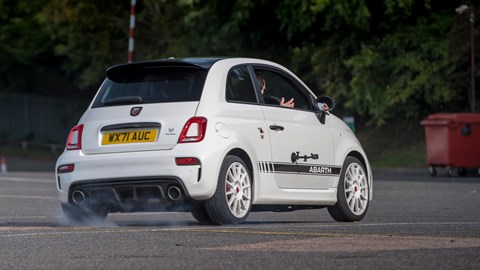
But no matter how well I construct the argument for not having a driving licence, my irrational and impulsive side is screaming at the absurdity of the prospect like a petulant railway worker who’s just been told he can’t have a raise this year. When I was 18, the only thing in my life that mattered was getting my licence and getting on the road. So I could do fun stuff like I am in the image above.
Why young people aren’t queuing up to get their driving licence
The study found that today’s youths leave the house 26% less often than the youngsters of the 1990s, citing factors such as social media and games consoles as key deterrents. If that wasn’t bad enough, the researchers suggested the downward trend could continue across subsequent generations if concepts like shared mobility and autonomous cars gain widespread popularity.
So, what’s causing youths to shun driving? Laziness? Maybe. But I reckon the car market should shoulder some of the blame. The global microchip shortage has made used cars hideously expensive. What was a £500 car when I was learning to drive is now a £1500 car – and that’s making it difficult for youngsters to get behind the wheel cheaply. And it’ll only get worse now that Truss is at the helm with a financial plan that’s poised to pitch the nation’s poorest people face-first into a fiscal cowpat.
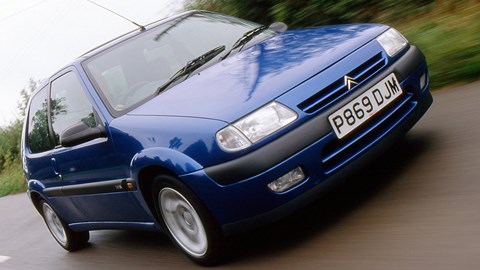
When I was 18, the market offered an endless supply of ropey 1990s hatchbacks to sift through. All my mates razzed around in cars like the Vauxhall Astra F, Mk4 Ford Fiesta and Citroen Saxo – and it didn’t matter if they saw the wrong side of a ditch, because we’d just pull all the good parts off them and graft them onto another unwilling £500 victim.
The government’s scrappage scheme corked our fountain, feeding around 400,000 perfectly serviceable second-hand cars into the crusher and ruining the used market in the process. Cheap old hatchbacks for teenagers to tear around in are now in short supply – and the ones that remain are becoming highly sought-after collector’s items.
Cars for young drivers: a national shortage
While I was writing this article, I browsed through the classifieds to gauge the current state of the market – and I wish I hadn’t bothered. I found a 1995 1.4-litre Vauxhall Astra F, almost identical to the one my mate Adam had when I was younger (minus a noisy twin-tip exhaust and a stereo powerful enough to blow the dome off Ally Pally). She’s pictured below, for all you Vauxhall aficionados.
The one I found online was priced at £2,500. Adam bought his for about £150 back in 2013 – and it was parked alongside a sea of similarly priced alternatives. This utterly disposable, ten-a-penny family hatchback has appreciated in value by 1567% in the space of nine years. If I was a provisional licence-holding youth today, inflation like that would put me off sitting my test too.
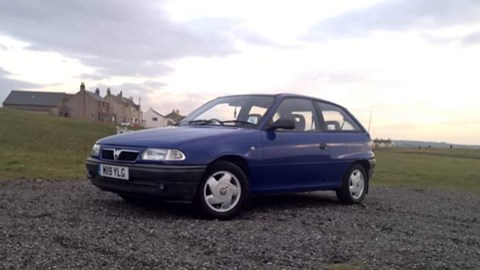
When I moved down south, I discovered something else. Young people don’t drive old cars anymore. Once they’ve passed their test, mummy and daddy take out a finance deal (if they’re fortunate enough to have that much spare cash at the end of each month) on a safe and reliable modern car like a Vauxhall Corsa or a Renault Clio.
Don’t get me wrong, I understand the reasoning. Cars like that, with their lane-keeping assist, traction control and airbags give parents a little more control over the safety of their children in the early stages of their motoring career. But I’ve learnt far more about how to preserve my safety while driving old cars than I ever will behind the wheel of something modern.
Old vs new: first-time buyers’ dilemma
A modern car doesn’t communicate to its driver. They can blare through standing water at motorway speeds and thrash around off-cambered corners, all the while isolating the driver from the sheer graft its chassis is doing to keep it on the tarmac.
Older cars make you work. Hit some standing water at speed in an old Fiesta (like the one pictured below), and you’ll have to manage the loss of grip yourself and learn how to correct the slide. You’re also acutely aware of just how delicate your body is when the only thing keeping you fixed to this mortal plane is your own talent and some 20-gauge steel. Fear like that forces you to become a better driver.
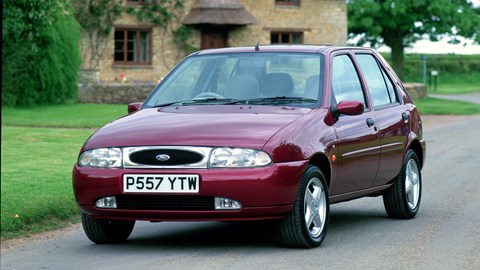
This erosion in the education of simple car control brings me onto my final rant: the death of the manual handbrake. My biggest problem with the current Corsa and Clio is that they both now come as standard with an electric handbrake – and that means youths can’t learn how to do handbrake turns in them. Stop laughing, it’s a serious problem.
Handbrake turns RIP
Experiencing the sensation of a car rotating around your hips and learning how to control the chaos is a very useful skill to have, especially living somewhere as wet as the UK. I reckon we should take a leaf out of Finland’s book – over there, students are required to spend time on a wet skidpan, learning how to control slides before they’re granted their full licence.
Despite the UK driving test’s lax attitude, the country’s youths are more than happy to educate themselves on the matter of handbrake turns. Just check any fast-food restaurant car park. The self-schooling persists for now, but the tradition will die out once the current crop of ratty manual-handbraked beaters is replaced by their electric-handbraked successors.
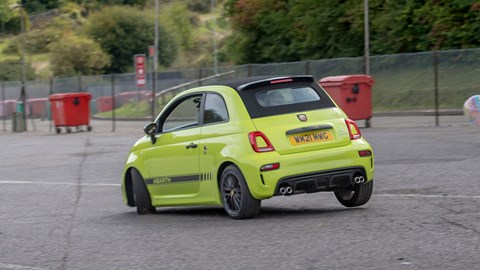
Happily, there are some manufacturers still championing the manual handbrake. Abarth is very keen to point out that all two of its cars can only be specified with a proper handbrake – and to celebrate its superiority, the company invited me down to Brands Hatch to relive my teenage years. It’s also thanks to the firm’s snapper that we have these images to look at.
Learning how to handbrake turn
I spent the day learning how to do handbrake turns correctly, just like Juha Kankkunen would on a hairpin in a rally special stage. The instructors also taught me how to handbrake turn into a parallel parking space – and while I was blatting around the car park, I had my moment of realisation.
In a few scant years, the last manual handbrakes will have been discontinued for auto-holding electric ones to boost brands’ NCAP scores and save insurers a few pennies on hill-start fender benders. Soon, we’ll have a generation of drivers who don’t know what a manual handbrake is – and I’m standing in no man’s land between the old and the new eras, watching the past burn.
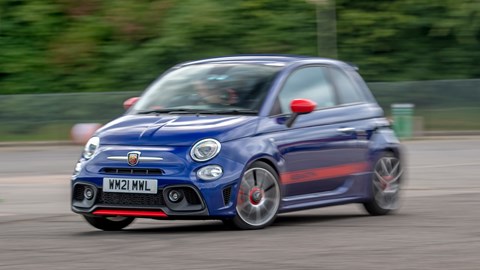
It’ll be a sad day when the proper handbrake is finally killed off. Some of my fondest driving memories involve using it incorrectly, and it saddens me to know future drivers will be denied the same joy.
So, if you’re a youth sitting on the fence about getting a driving licence, my advice to you is to do it now. Then, buy the cheapest (working) old car you can find and absorb every analogue experience it offers you before the digital era sweeps over the motoring landscape like a plague.